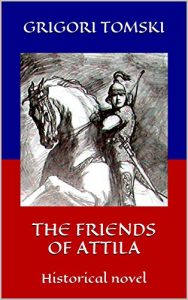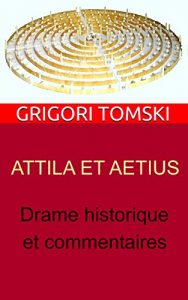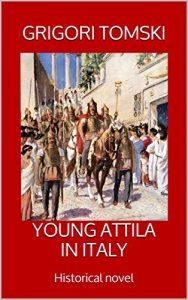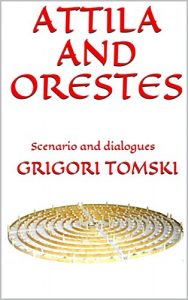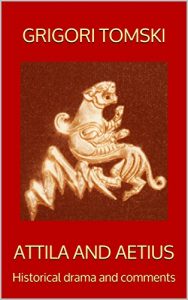The life of Attila, sung for a thousand years by the German bards, will continue to inspire writers and film-makers. This novel gives a most truthful reconstruction of the customs and the mentality of the Huns because I am of Siberian origin.
Alexei Okladnikov (of the Academy of the USSR) noted: "Ancient Turkish Siberia is more closely linked with the West than with the East. Its culture is richer than one might imagine. On the shores of Baikal, Angara and Lena crossed the cultural influences of East and West, there were powerful cultural centers; We can not understand the history of Eurasia without knowing them. "
He points out that the route of the Huns "towards the Danube began from their fortresses of the region of Baikal". My grandparents lived about the same life as the Huns of Attila. Many Sakhas from the shores of Lena are still practicing this kind of life.
The cult of Tangra, which was the religion of Attila and Genghis Khan, is still alive in Sakha Country (Yakutia) while it has long since disappeared in Central Asia and Mongolia. The flag of Yakutia is a Tangra flag, blue and with the white sun, the Tangrais cross are engraved on the door of the Parliament.
This approach makes it possible to elucidate certain "mysteries of Attila", for example, the enigmas of the Catalaunian Fields, his meeting with Pope Leo, his relations with the Roman princess Honoria.
The aim of this novel is not the idealization of Attila, but there is no need to demonize him to create interesting works about his time, filled with drama.
TABLE OF CONTENTS
Prologue / Orestes / Embassy
Kere-ko / Prince Ellak / Banquet
City of Sun / Military games / Messenger of Aetius
Khan Attila / Decision / Discussions /
Alans / Wind of the steppes / In Germany
Count Bonifacius / Francs / Vandales
Visigoths / Mission of Darius / Bishop Augustin
Burgunds / Country of ancestors / Death of Bonifacius
Second Oath / Master of the Empire / Princess Honoria
Paix de Margum / Back in Gaul / Minister and General
Dream of Honoria / Cooling of relations / Pop Leo
Margum's Incident / Taking of Sirmium / Governor of the Balkans
Constantinople spared / Great Eunuch / Huns and Romans
Attila begins investigation / Parental Diplomacy / Greeks of Hunland
In the royal district / International Scandal / Letter from Honoria
Confrontation / Great Army / Offensive
Return of the army / Battle / Testament of Attila
War in Italy / Attila ans Leo / Great ride
Death of Attila / Ardaric's Revolt / Death of Aetius
Proposals /Avitus / Majorien
Decomposition of the Empire / Julius Nepos
Romulus Augustule / Latest Conversations
Main characters / Other Characters
"The statements of any nations can no longer deny that the plan of this king, one of the greatest that world has known, was European unity. Was imposed upon his genius when he had seen the Germanic princes and the representatives of the Gallic peasants, the Iberians, the Britons, the Scandinavians, and the Greeks rush towards him. All those who did not want to see a detestable anarchy settling in the ruins of Rome ... "
Marcel Brion, of the French Academy
(Théodoric, roi des Ostrogoth, Tallendier, 1979, p. 162).
"The races of command, the imperial nations are few in number. Beside the Romans, the Turco-Mongols were among them. "
René Grousset, of the French Academy
(L’Empire des steppes, Payot, 1965, p.28).
"The military fronts of the Altaic nomads cover - with the exception of the Maghreb - the whole theater of conflicts of the ancient and medieval world. In the two millennial when these nomads exercise their pression, on two occasions they are present on a world scale: in the IV-V centuries and in the XIII-XV centuries of our era. The first time by a series of invasions causing the fall of the empires Han (China) and Gupta (India) and indirectly that of the Roman Empire ... "
Gerard Chaliand
(Les Empires nomades, de la Mongolie au Danube, Perrin, 1995, p. 59.)
Alexei Okladnikov (of the Academy of the USSR) noted: "Ancient Turkish Siberia is more closely linked with the West than with the East. Its culture is richer than one might imagine. On the shores of Baikal, Angara and Lena crossed the cultural influences of East and West, there were powerful cultural centers; We can not understand the history of Eurasia without knowing them. "
He points out that the route of the Huns "towards the Danube began from their fortresses of the region of Baikal". My grandparents lived about the same life as the Huns of Attila. Many Sakhas from the shores of Lena are still practicing this kind of life.
The cult of Tangra, which was the religion of Attila and Genghis Khan, is still alive in Sakha Country (Yakutia) while it has long since disappeared in Central Asia and Mongolia. The flag of Yakutia is a Tangra flag, blue and with the white sun, the Tangrais cross are engraved on the door of the Parliament.
This approach makes it possible to elucidate certain "mysteries of Attila", for example, the enigmas of the Catalaunian Fields, his meeting with Pope Leo, his relations with the Roman princess Honoria.
The aim of this novel is not the idealization of Attila, but there is no need to demonize him to create interesting works about his time, filled with drama.
TABLE OF CONTENTS
Prologue / Orestes / Embassy
Kere-ko / Prince Ellak / Banquet
City of Sun / Military games / Messenger of Aetius
Khan Attila / Decision / Discussions /
Alans / Wind of the steppes / In Germany
Count Bonifacius / Francs / Vandales
Visigoths / Mission of Darius / Bishop Augustin
Burgunds / Country of ancestors / Death of Bonifacius
Second Oath / Master of the Empire / Princess Honoria
Paix de Margum / Back in Gaul / Minister and General
Dream of Honoria / Cooling of relations / Pop Leo
Margum's Incident / Taking of Sirmium / Governor of the Balkans
Constantinople spared / Great Eunuch / Huns and Romans
Attila begins investigation / Parental Diplomacy / Greeks of Hunland
In the royal district / International Scandal / Letter from Honoria
Confrontation / Great Army / Offensive
Return of the army / Battle / Testament of Attila
War in Italy / Attila ans Leo / Great ride
Death of Attila / Ardaric's Revolt / Death of Aetius
Proposals /Avitus / Majorien
Decomposition of the Empire / Julius Nepos
Romulus Augustule / Latest Conversations
Main characters / Other Characters
"The statements of any nations can no longer deny that the plan of this king, one of the greatest that world has known, was European unity. Was imposed upon his genius when he had seen the Germanic princes and the representatives of the Gallic peasants, the Iberians, the Britons, the Scandinavians, and the Greeks rush towards him. All those who did not want to see a detestable anarchy settling in the ruins of Rome ... "
Marcel Brion, of the French Academy
(Théodoric, roi des Ostrogoth, Tallendier, 1979, p. 162).
"The races of command, the imperial nations are few in number. Beside the Romans, the Turco-Mongols were among them. "
René Grousset, of the French Academy
(L’Empire des steppes, Payot, 1965, p.28).
"The military fronts of the Altaic nomads cover - with the exception of the Maghreb - the whole theater of conflicts of the ancient and medieval world. In the two millennial when these nomads exercise their pression, on two occasions they are present on a world scale: in the IV-V centuries and in the XIII-XV centuries of our era. The first time by a series of invasions causing the fall of the empires Han (China) and Gupta (India) and indirectly that of the Roman Empire ... "
Gerard Chaliand
(Les Empires nomades, de la Mongolie au Danube, Perrin, 1995, p. 59.)
